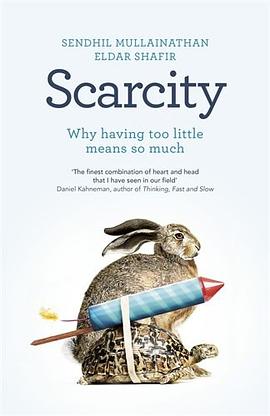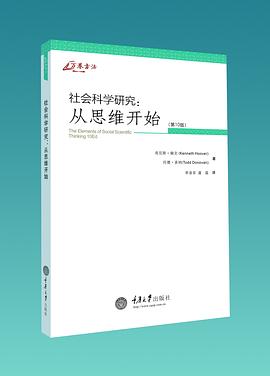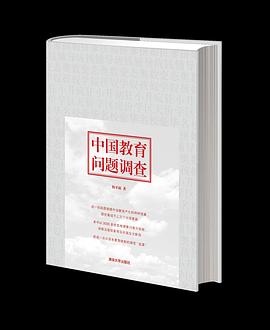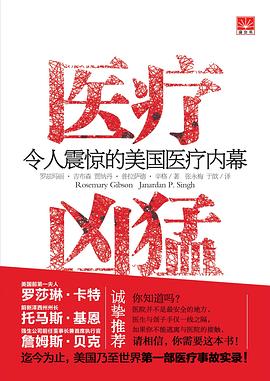

具体描述
A surprising and intriguing examination of how scarcity—and our flawed responses to it—shapes our lives, our society, and our culture
Why do successful people get things done at the last minute? Why does poverty persist? Why do organizations get stuck firefighting? Why do the lonely find it hard to make friends? These questions seem unconnected, yet Sendhil Mullainathan and Eldar Shafir show that they are all are examples of a mind-set produced by scarcity.
Drawing on cutting-edge research from behavioral science and economics, Mullainathan and Shafir show that scarcity creates a similar psychology for everyone struggling to manage with less than they need. Busy people fail to manage their time efficiently for the same reasons the poor and those maxed out on credit cards fail to manage their money. The dynamics of scarcity reveal why dieters find it hard to resist temptation, why students and busy executives mismanage their time, and why sugarcane farmers are smarter after harvest than before. Once we start thinking in terms of scarcity and the strategies it imposes, the problems of modern life come into sharper focus.
Mullainathan and Shafir discuss how scarcity affects our daily lives, recounting anecdotes of their own foibles and making surprising connections that bring this research alive. Their book provides a new way of understanding why the poor stay poor and the busy stay busy, and it reveals not only how scarcity leads us astray but also how individuals and organizations can better manage scarcity for greater satisfaction and success.
作者简介
Sendhil Mullainathan is Professor of Economics at Harvard University. His real passion is behavioral economics, understanding what makes people tick - whether a senior executive in New York or a farmer in rural Tamil Nadu.
He enjoys having written but is of a mixed mind about writing.
He also occasionally enjoys doing: he helped co-found a non-profit to apply behavioral science (ideas42); and has worked in government.
Much to the surprise of who know him well, he is a recipient of the MacArthur "genius" award.
His hobbies include basketball, googling and fixing-up classic espresso machines. He also enjoys speaking about himself in the third person, which works well for bios but less well in daily life.
Eldar Shafir is an American psychologist, and the author of Scarcity: Why Having Too Little Means So Much[1] (with Sendhil Mullainathan). He is the William Stewart Tod Professor of Psychology and Public Affairs at Princeton University Department of Psychology and the Woodrow Wilson School of Public and International Affairs. He is a Faculty Associate at the Institute for Quantitative Social Science at Harvard University. He is co-founder and Scientific Director at ideas42, a social-science R&D lab. His area of study is behavioral economics, that is, how the decisions people make affect their financial outcomes. His research has led him to the general conclusion that people often make inadvisable decisions on financial matters when they think they are being rational.
目录信息
Chap. 1 - The good: scarcity can cause focus. The bad: focus can mean inattention to other things.
Chap. 2 - Scarcity causes an internal disruption that makes it harder to make good decisions.
Chap. 3 - Slack (the opposite of scarcity) allows better choices and reduces the bad consequences of failiure.
Chap. 4 - Poor people are sometimes more realistic about estimating costs, because they have to be.
Chap. 5 - Borrowing when you're short of cash leads to a descending spiral of debt.
Chap. 6 & 7 - Poverty is a vicious circle of scarcity leading to bad decisions leading to scarcity...
Chap. 8 - Poverty can be alleviated by creating slack, such as extra cash or day care to create more time.
Chap. 9 - Efficient use of resources and division of labor helps organizations become more efficient.
Chap. 10 - Efficient use of self-control helps with life issues.
· · · · · · (收起)
读后感
作者:安替 【导读】人们总是说,只有对钱抱有百分的渴望,才能够拥有钱。穷人是因为渴望不够吗? 穷人只所以贫穷是因为他们不努力吗,拖延症患者之所以拖拉是因为不知道时间宝贵吗,本文从心理学、行为经济学和政策研究揭示了一个天才发现。美国一个跨学科团队今年完成了一...
评分偶然在微信朋友圈里看到介绍一篇《稀缺》的书评,读过之后就立即把书买了下来。吸引我的不是别的,正是“稀缺”这个主题。书的引言里说描写了书作者塞德希尔面临的忙碌和焦虑,相信这个也是很多职场人的切身体会,至少我深有感触: 我的工作是IT技术支持,工作职责就是解决客...
评分作者:安替 【导读】人们总是说,只有对钱抱有百分的渴望,才能够拥有钱。穷人是因为渴望不够吗? 穷人只所以贫穷是因为他们不努力吗,拖延症患者之所以拖拉是因为不知道时间宝贵吗,本文从心理学、行为经济学和政策研究揭示了一个天才发现。美国一个跨学科团队今年完成了一...
评分我没看过这本书,为什么要写书评? 这是我至今唯一一本没有看过就写书评的书。我看了目录和其他人的书评,关于匮乏,我有话要讲。 是心态。 如果缺时间,就不会想要15分钟后再吃棉花糖,就不会坚持锻炼,就不会觉得睡眠是最大的投资。 如果缺钱,就不会考虑学习,不会考虑投...
评分用户评价
#有点儿意思
评分我觉得作者就几个概念反复论证涵盖了整本书:Scarcity虽然说双刃剑(让人更专注而有效率但也使得人目光短缺做出不明智的选择);所谓的bandwidth无非就是cognitive capacity;要明白人思考的轨迹而分析现实中的原委以此来改善制度与规则。#就这些为什么要写满一本书啊
评分一本书只论证了一个问题:为什么越“穷”会越“穷”?穷,在一定程度上会引起专注。但另一方面,又大量占用了带宽(认知能力和执行能力)。在特定事件的专注(tunnelled),必然导致其他事情被遗忘或盲目。在一系列的救火过程中(firefighting)便不由自主的陷入恶性循环。进一步,富足(abundance)往往也孕育着稀缺的种子。“穷”往往是一系列行为和思维模式所导致。即便在富足时期,稀缺思维和行为也不能为未来带来冗余(slack)和容错(failure tolerance)。缺乏冗余和容错,任何系统都过于刚性,易碎易毁。所以,对个体而言,跳脱这种稀缺陷阱需要冗余和容错机制。对宏观政策,则需明晰个体的思考轨迹,辨别根本原委、建立制度和规则,以改变和完善社会。
评分一句话来回说了一千遍:稀缺性占用你带宽,让你脑子想不清楚,也跳不出来因为稀缺性心态已经深植于潜意识,无论这稀缺是金钱、时间、社交还是卡路里额度。长袖才能善舞,从容(slack)才能不迫(妈的这还要你说
评分经济上的贫困往往伴随时间与精力上的贫困
相关图书
本站所有内容均为互联网搜索引擎提供的公开搜索信息,本站不存储任何数据与内容,任何内容与数据均与本站无关,如有需要请联系相关搜索引擎包括但不限于百度,google,bing,sogou 等
© 2025 book.wenda123.org All Rights Reserved. 图书目录大全 版权所有




















